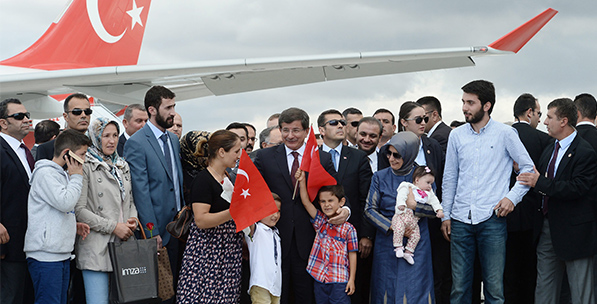The Meaning of Discourse on the AK Party and Others
The integrative modernization understanding of the AK Party comprising different races, cultures and social structures, unlike the opposition parties, makes the party the main actor in Turkish politics.
More


What Will Voters Pay Attention to in the Early Elections?
Voting behavior in the upcoming Nov. 1 elections will be determined by both the parties' campaigns on the economy and the opposition parties' failure to form a coalition government.
More
There were two additional reasons, which deserve attention. One is short-term considerations and the second is ideological differences.
Here is a political hyperreality: Turkey, while fighting against all terrorist groups in the region, is somehow being portrayed to the world as if it is ignoring the threat.
Turkeys next government must reflect each partys minimum requirements and modest goals rather than dreams of a grand transformation.
If it becomes clear that the AK Party and the CHP will fail to form a coalition government, the MHP will be faced with a tough decision. The party will either stick to its guns or limit its criticism of the AK Party to negotiate the terms of coalition.
The New Normal in Turkish Politics
Economists are fond of using the term new normal to depict the changing perception of normalcy in domestic and international markets following a major crisis, or turning point that radically alters the fundamental parameters of the system.
More


Turkey: Coalition Government Versus Early Elections
Since the AK Party has failed to secure majority in Parliament allowing the party to form a single-party government, various coalition scenarios are on the table now to determine Turkey's future politics.
More
The parliamentary system in Turkey did not isolate or end the antidemocratic means of intervention in democratic processes.
Sadık Ünay, the Economy Director of SETA, had a speech about the experience of Turkey on foreign aid and development cooperation issue at the Conference of Changing Nature of Development Aid.
In modern democratic politics, one of the most effective instruments of attracting electoral support is extending pledges for better macroeconomic governance and improvement of social welfare.
The future of Turkish-Serbian bilateral relations was discussed at a conference entitled "Turkey and Serbia in the 21st Century" in Belgrade, Serbia.
There can be no security for Israel if Palestinians do not have their basic rights.
The coming months will provide ample opportunity to examine and learn how competing political parties are planning to tackle the seemingly challenging task of higher education reform in Turkey.
Forty-nine hostages were rescued from ISIS after a successful operation. Considering the delicacy of the situation, the supervision and conduct of this operation appear worthy of commendation.
If you were to scratch today's date off a number of ideologically-charged opposition papers and replaced them with, say, 1989 or 2002, you would encounter no absurd situation.
The Aug. 10 presidential election marked the beginning of a period when the people alone serve as the center of the new Turkey, and the sole authority of which any politician or movement willing to engage in constructive politics ought to appeal.
Erdoğan's victory on Aug. 10, coupled with Davutoğlu's emergence as the AK Party's new chairman, proved the opposition's attempts futile.
People tend to think about politics in terms of decades. Thanks to Turkey's transformation, we are currently contemplating the next decade of the country's politics with exclusive reference to political parties and the agency of their leaders.
Erdoğan's timely, direct and proactive moves reduced the time span of Turkey's normalization and democratization, and promoted economic stability.
The Gülenist parallel state began to operate with help from affiliated members of law enforcement, public prosecutors and judges, the covert organization gained access to all levels of government.

















